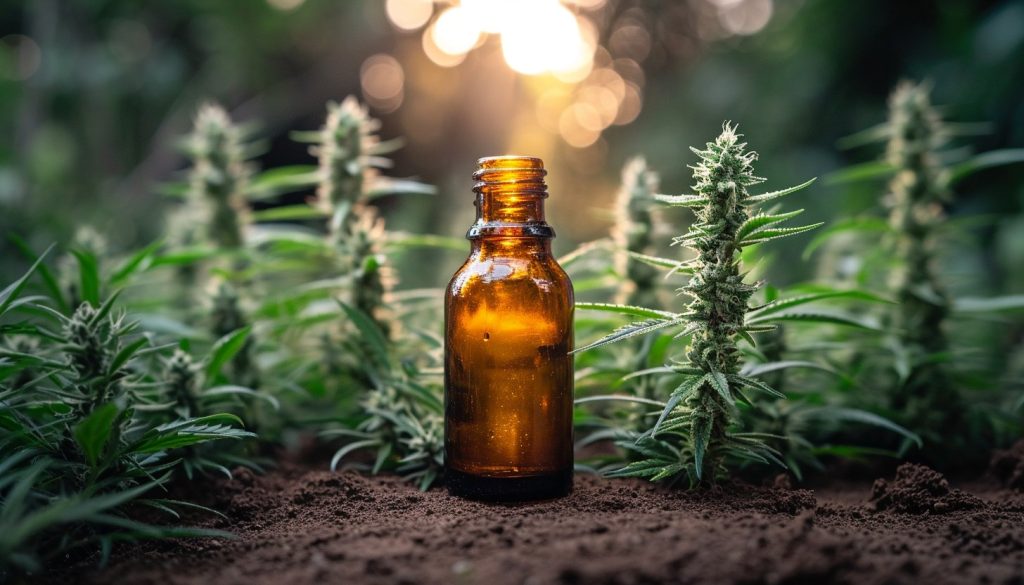Hyperthyroidism is a condition characterized by excessive production of thyroid hormones by the thyroid gland, leading to symptoms such as anxiety, weight loss, rapid heart rate and fatigue. Cannabidiol (CBD) is an active ingredient present in cannabis and whose therapeutic benefits are increasingly recognized. In this article, we will explore the interactions between CBD and hyperthyroidism.
Sommaire
ToggleHow does CBD work?
CBD is a non-psychoactive compound in cannabis that interacts with the endocannabinoid system (ECS), a signaling pathway regulating numerous biological functions such as inflammation, pain, mood and digestion. Cannabinoids act mainly on two receptors: CB1, present mainly in the central and peripheral nervous system, and CB2, located mainly in immune cells. CBD also has anti-inflammatory, anticonvulsant and neuroprotective effects, which can be beneficial in certain syndromes and conditions such as epilepsy, multiple sclerosis and hyperthyroidism.
CBD and regulation of thyroid function
Studies have shown that the ECS plays an important role in maintaining the body’s homeostasis, including thyroid function. Indeed, CB1 and CB2 receptors have been detected in thyroid tissue, suggesting that cannabinoids could have a direct impact on this gland.
A study in rats observed that CBD treatment could alleviate the pro-inflammatory effects of hyperthyroidism, including decreasing the gland’s production of thyroid hormones. Although there are no clinical studies confirming these results in humans yet, this opens the way for further research into the potential role of CBD in the treatment of hyperthyroidism.
CBD and symptoms associated with hyperthyroidism
Anxiety
Anxiety is a common symptom in people with hyperthyroidism, and several studies have shown that CBD may help relieve this symptom through its action on cannabinoid receptors. CBD also interacts with the neurotransmitter serotonin, which plays a vital role in regulating mood, potentially helping to ease anxiety related to hyperthyroidism.
Insomnia
Sleep disturbance is often reported in patients with hyperthyroidism, and CBD may help improve sleep quality by modulating cannabinoid receptor activity. Several studies have shown that administering CBD helped extend sleep duration and reduce nighttime waking episodes in people suffering from insomnia or other sleep disorders.
Muscle and joint pain
Muscle and joint pain are also common in hyperthyroidism, and the anti-inflammatory action of CBD may be helpful in relieving these symptoms. By acting on cannabinoid receptors, CBD could reduce the production of pro-inflammatory mediators, such as cytokines, and thus reduce the pain associated with inflammation.
CBD and Drug Interactions for Hyperthyroidism
As with any dietary supplement or alternative treatment, it is important to consider possible interactions between CBD and medications prescribed for hyperthyroidism. Some medications may have their blood levels altered by the presence of CBD, which could either affect their effectiveness or cause unwanted side effects.
It is therefore essential to consult a doctor before using CBD for better management of hyperthyroidism or its symptoms, in order to guarantee optimal effectiveness of the treatment while minimizing the risks of drug interactions.
Dosage and Administration of CBD for Hyperthyroidism
The appropriate CBD dosage can vary greatly from person to person, depending on factors such as the severity of symptoms, weight, age, or the presence of other medical conditions. It is therefore important to start with a low dosage of CBD and gradually increase depending on individual response and the effects experienced.
CBD is available in several forms, such as sublingual oils, capsules, creams and even sprays. Each person will need to find the delivery method that works best for them based on their specific preferences and needs.
Summary :
In conclusion, CBD could represent an interesting option to help manage the symptoms associated with hyperthyroidism thanks to its action on the endocannabinoid system and its anti-inflammatory, anxiolytic, and sleep-promoting properties. However, it is important to consult a healthcare professional before using it for this indication, in order to take into account possible drug interactions and adapt the dosage according to each individual.



